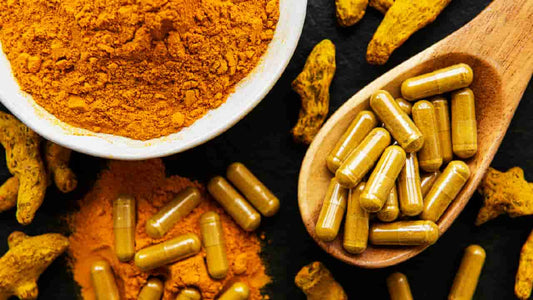Golden spice, otherwise known as turmeric, is a plant that grows in Asia and Central America.
This remarkable spice is often added to Asian cuisine for its warm, bitter taste and vibrant color. Though it’s also been used for centuries in Ayurvedic medicine for the treatment of a variety of health conditions.
So, it’s unsurprising that turmeric is commonly used in modern days as a health supplement. Reducing pain and inflammation, easing symptoms of depression and anxiety, and potentially aiding digestion are just a few proposed health benefits.
With the growing popularity of turmeric and the abundance of different supplements and doses, it can be difficult to know what and how much you should take.
While a little goes a long way when adding the spice to a dish, how much do we need to feel the many health benefits?
This article tells you all you need to know about turmeric including its optimal dosage and possible side effects!
What is Turmeric?
Turmeric is a spice that packs as much flavor as it does health benefits!
The vibrant spice is one of the most used spices in Asian cuisine and is one of the most popular health supplements on the market right now.
You can find turmeric in the form of capsules, teas, and powders, or as a key ingredient in top joint supplements such as Performance Lab Flex.
If you’ve heard of turmeric, you may have also heard of curcumin.
Curcumin is the active ingredient of turmeric and is thought to be the compound that provides many of turmeric’s health benefits, particularly reducing pain and inflammation.
This is why you may also often see curcumin and the curcuminoids (other turmeric compounds) also being sold as supplements alongside turmeric.
It is thought that the extracts of these compounds have a higher potency than turmeric alone, which is somewhat true, though the absorption appears to be suboptimal. Though, more research is needed to confirm the details of this claim.1
For now, let’s take a closer look at the health benefits of turmeric!
Health Benefits of Turmeric
Reduces Pain and Inflammation
The main use of turmeric is for the reduction of pain and inflammation, especially when associated with osteoarthritis.
Many studies have looked at the effect turmeric has on symptoms of osteoarthritis and has found supplementation to be effective in easing pain, inflammation, and improving physical function.1
Reduces Symptoms of Depression and Anxiety
One study has suggested turmeric to be effective in reducing symptoms of depression and anxiety over an 8-week period of supplementation when compared with a placebo.1
Potentially Lowers Cholesterol
A few studies have looked at the effect turmeric has on those with high cholesterol. It was found that turmeric may reduce triglycerides (fat in the blood), and cholesterol levels as a result. 1
Potentially Aids Digestion
Research is still in its early days, but it has been suggested that turmeric may play a role in aiding digestion.
Turmeric is being looked at for its potential use as a treatment for certain digestive conditions such as IBS.1
If you want to know more about “What is Turmeric Good For?”, check out our linked guide.
Turmeric: How Much Should I Take?
There is currently no official optimal dose at the time of writing, only what has proven to be effective in most studies.
Studies looking at turmeric’s effect on symptoms of osteoarthritis, as well as depression and anxiety, have concluded 500mg twice daily to be effective, and doses of up to 700mg twice daily for high cholesterol.1
The World Health Organisation (WHO) has determined 1.4mg per pound (0-3mg/kg) of body weight as an acceptable daily intake.2
However, high doses of turmeric consumption are not recommended long-term due to the lack of research confirming the safety.
Side effects of turmeric have been noted in cases of high doses, including nausea, stomach pain, and diarrhoea.
Doses of 250mg have also been shown to be effective, which is the dose contained in Performance Lab Flex. While this dose is effective, it’s also a safer dose to take long-term with minimal side effects.
References
- K. Patel. Curcumin. Examine.com. 2021
- Amalraj A, Pius A, Gopi S, Gopi S. Biological activities of curcuminoids, other biomolecules from turmeric and their derivatives - A review. J Tradit Complement Med. 2016 Jun 15;7(2):205-233.















